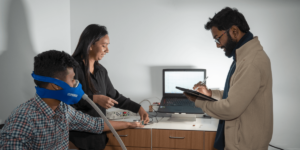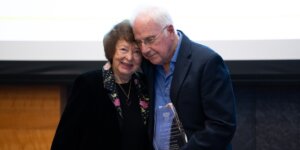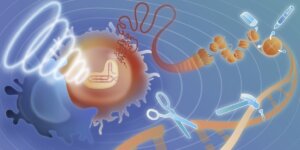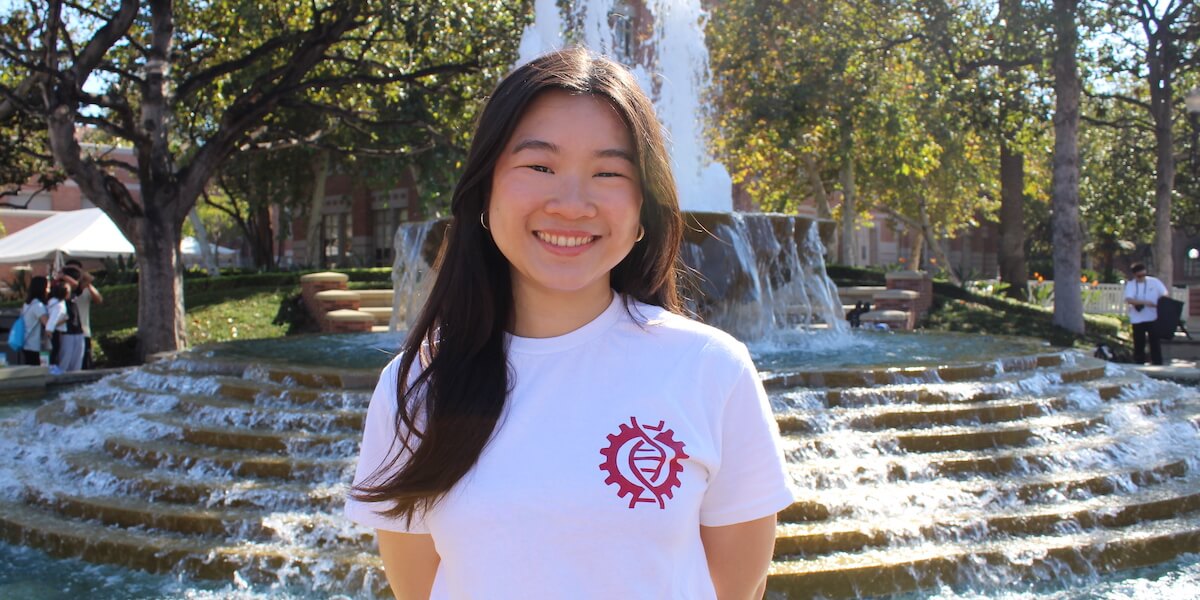
Sabrina Sy, a USC Viterbi graduating senior in the Alfred E. Mann Department of Biomedical Engineering, believes more inclusive healthcare starts with culturally and socially conscious physicians.
There is no clear solution to the issue of deficiencies in gender-affirming healthcare for LGBTQ+ populations, but Sabrina Sy, a USC Viterbi graduating senior in the Alfred E. Mann Department of Biomedical Engineering, believes more inclusive healthcare starts with culturally and socially conscious physicians.
“Most important is making sure physicians are trained to do their jobs, because the last thing someone who is already being shut out of society, and policed by legislation, and prejudiced against, is a doctor who will not advocate for them,” Sy said.
For Sy, who also has a minor in gender and sexuality through the Department of Gender and Sexuality Studies at the USC Dornsife College of Letters, Arts and Sciences, stepping into a medical setting is already incredibly anxiety-inducing for most, so imagine what it would feel like to have your doctor refuse to affirm who you are as a person.
Sy entered college knowing she wanted to minor in something non-STEM related to supplement her science and math-heavy major. In high school, Sy had an interest in women’s and LGBTQ+ issues, so when she took a gender and sexuality course and loved it, she decided to declare her minor.
“Gender studies is a field embedded in everything” Sy explains, “it’s about how we interact with one another in society, why certain social and political phenomena exist, and how everything is informed by how we perceive one another’s gender and sexualities.”
Sy could not help but view gender studies with an engineering mindset. She had learned in engineering that, historically, deficits existed in what genders were considered when medical devices were designed.
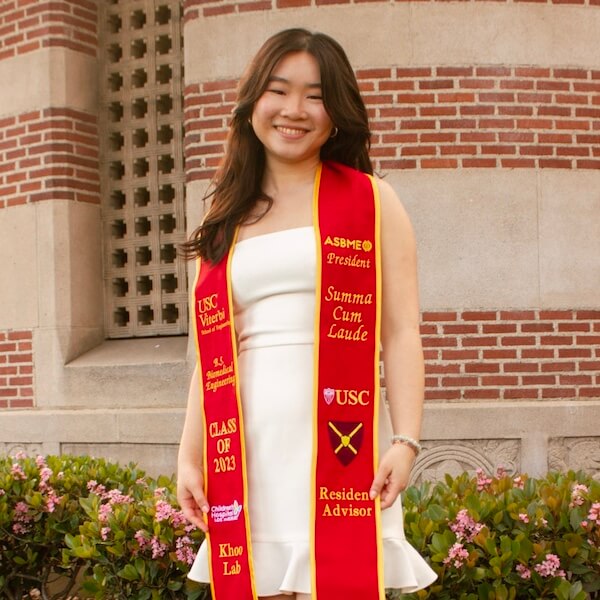
After graduation, Sy plans to continue working in the medical device industry to gain more experience before attending medical school to pursue her passion.
“Women’s and LGBTQ+ health are some of the most underfunded spaces in the medical device industry and in the scientific community as a whole, which is why I think I was interested in gender studies in the first place,” Sy explains. “Gender and structures of power have informed how we make medical devices and how stuff gets pushed out to market, impacting what sort of patients benefit from certain technologies.”
As someone interested in becoming a physician and pursuing pre-medicine, Sy had a curiosity about how gender is discussed in a clinical setting when patients are seeking out gender-affirming care. Sy’s research began to take shape while perusing potential medical programs. Looking at the requirements of various medical school curriculums she noticed there seemed to be very few that emphasized LGBTQ+ health.
Sy decided to dig more thoroughly. Through her junior and senior research seminars in gender and sexuality, Sy conducted two revealing research studies about the deficiencies in training for gender-affirming care: “The Doctor is In…Competent: Investigating the lack of comprehensive gender-expansive sexual and reproductive healthcare curriculums in medical schools” and “First, Do No Harm: Investigating the lack of comprehensive LGBTQ+ healthcare curriculums in medical training and respective attitudes among practicing physicians in major Southern California hospitals”
Speaking about her findings Sy explained: “There are very binary and concrete ways that people talk about gender in terms of medical care, and I think a lot of it is informed by how people are actually trained to work with patients.” Sy continues, saying what she was really interested in was, “What are we actually teaching medical students in schools, and how do they practice that in the clinical setting?”
Sy found that gender-affirming care was only sometimes offered as an elective course, and although all medical students take sexual reproductive healthcare courses, LGBTQ+ healthcare is rarely emphasized and often briefly covered sometimes in a single lecture.
The lack of comprehensive training translates to harmful effects in the clinical setting. A common example is doctors misgendering patients, misconceptions, and assumptions about what patients’ partners and families may look like. According to Sy, more common, however, is a complete disregard for a patient’s opinions and needs.
Sy explained that when seeking gender-affirming care for top surgery, patients will likely encounter one of two scenarios. Either they are flat-out denied the care they request by physicians and psychiatrists, or the patient must prove there is a medical problem to obtain approval for the surgery. “There is either a complete shut-off from being able to access care, or an over-diagnosis, that there is something ‘wrong’ with you and we need to fix it, both of which are harmful.”
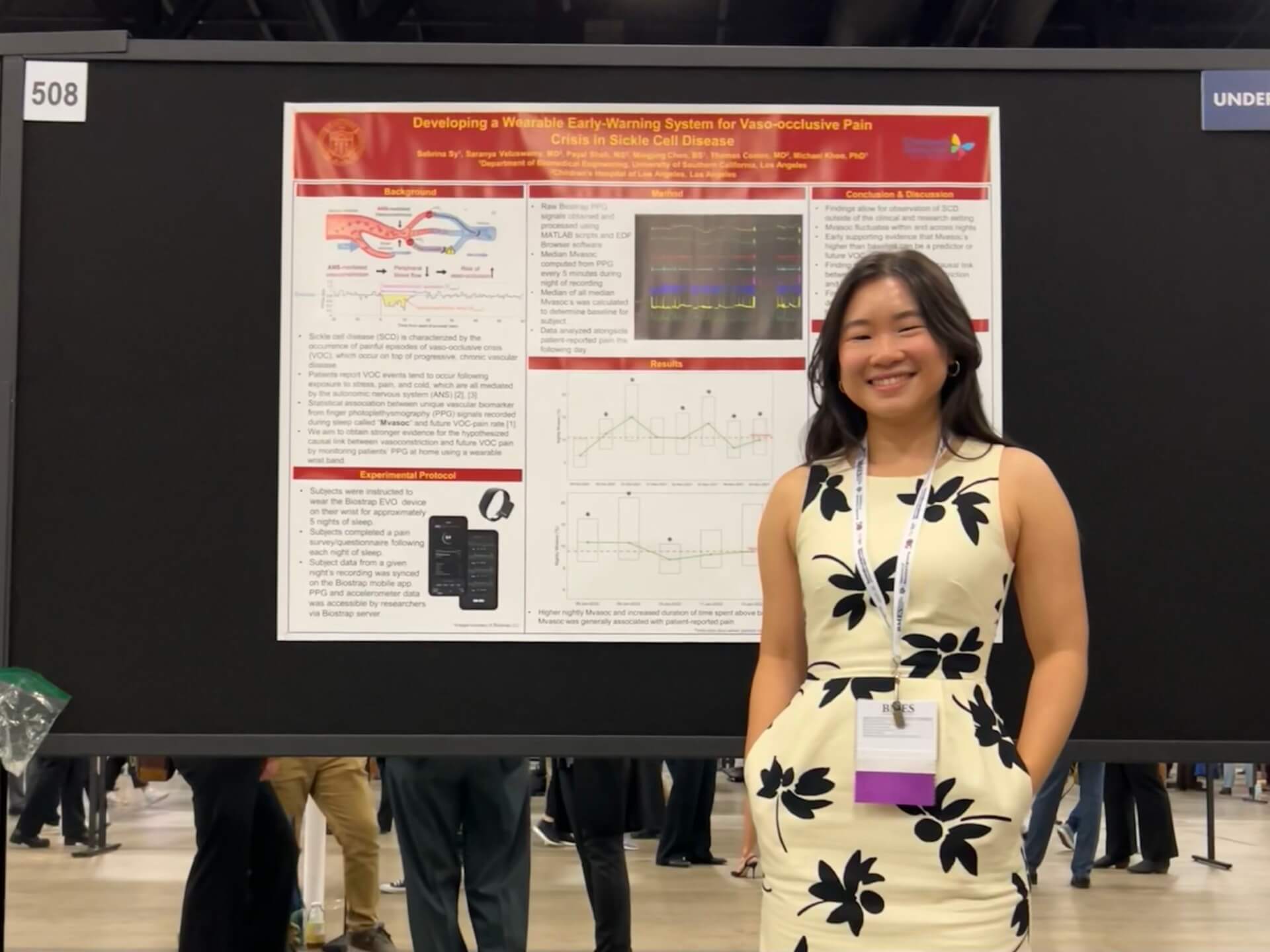
Sy presenting at the BMES Undergraduate Research Symposium
Barriers to a stronger presence in LGBTQ+-affirming care point to a common issue in the United States healthcare industry — a lack of diversity. “For a long time, medicine has extremely lacked diversity, it was something only the most privileged people in society were able to pursue, and as a result, there have not been diverse perspectives or interests in medicine” like LGBTQ+ health issues,” Sy said.
However, incremental progress is being made. “Every year, medical school classes are becoming more diverse and more representative of the patient populations they serve, and with that needs to come the updating of curriculums so that they are reflective of everyone.” Furthermore, many medical students supplement the gap in their education by proactively educating themselves outside the classroom either in a clinical setting or even conducting their own research into the matter.
Sy points out that there also needs to be accountability for physicians who are doing harm and a change in how society thinks about transgender and LGBTQ+ healthcare. She believes public education is an integral component in the process of improving the healthcare system to be more inclusive.
The intersection of Sy’s major and minor made her realize there is a gap in engineering education when it comes to baseline understanding of who the patients are BME students are learning to design devices for. “There need to be more humanities and ethics conversations in engineering in general. I don’t think we have enough of that.”
One new area of conversation — a USC Viterbi student-led publication, Viterbi Conversations in Ethics — is actually led by Sy herself. As editor-in-chief, the on-line publication has evolved beyond ethical considerations regarding specific technology. “We had a lot of students write about the (NAE) Grand Challenges, which is a really big part of Viterbi, and that was the first publication ever done that was not a discussion about a specific technology, but about the role of engineers as a whole within how the Grand Challenges are outlined.”
Sy’s passion for women’s and LGBTQ+ health is easily spotted in her other endeavors as an undergraduate at USC.
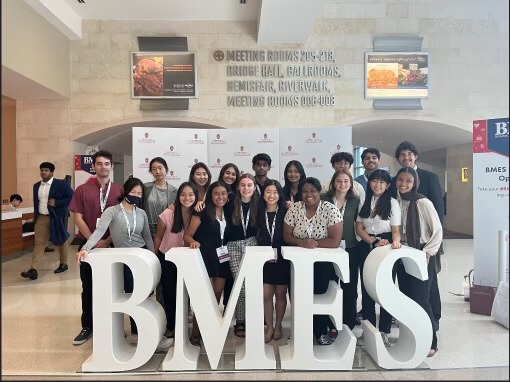
Sy with fellow peers in the Biomedical Engineering Society. Another one of her extra-curricular activities.
Sy co-founded the startup, MicroMaterna, as a collaboration with three other BME students and some of her best friends. The students formed the company to create easy, at home screening devices for women to monitor pre-eclampsia throughout their pregnancies with the goal to expand global maternal and fetal healthcare standards. The startup was awarded 2nd place in the Min Family Challenge and 3rd place in the Maseeh Entrepreneurship Prize Competition, winning $10,000 in prize money for the company.
Sy has also been a member of multiple MEDesign teams, where she designed a rehabilitation device that helps stroke patients recover hand dexterity. She also shadowed NICU physicians to help improve the accuracy and standardization of spinal tap procedures in neonates.
In addition, Sy has served as the President of the Associated Students of Biomedical Engineering (ASBME), which was recently awarded the 2022 Outstanding Mentoring Program Award from the Biomedical Engineering Society (BMES).
Sy has accomplished all of this and much more while dedicating four years to undergraduate research with Professor Michael Khoo, conducting sickle cell research with the Children’s Hospital of Los Angeles.
Sy asserts that her studies in biomedical engineering and gender and sexuality have informed what she wants to do in the future, combining the aspects of her education into creating better and more inclusive devices and environments for all patients. After graduation, Sy plans to continue working in the medical device industry to gain more experience before attending medical school to pursue her passion.
Her advice to the admitted class of 2023 is straightforward:
First, “Just do what you like — four years is going to fly by, so you might as well take that time doing what you actually love and enjoy.”
“Second, take advantage of the people around you at USC; take the time to sit down and discuss your passions, and if you find a person who is willing to be there for you, stick with that throughout undergrad because it’s better to have those people in your circle and not take them for granted.”
And finally: “Take some time for yourself.” College students often feel guilty if their day is not scheduled to fill every hour with productive academic work. “Yes, you are in college to be a student, but also to figure out who you are and enjoy life,” Sy confirms. “You definitely have time for it.”
Published on May 12th, 2023
Last updated on May 12th, 2023





